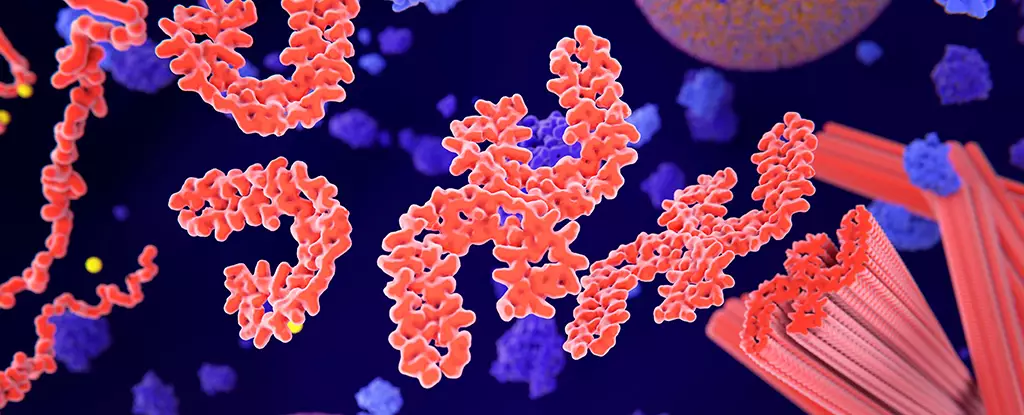Alzheimer’s disease, a devastating neurodegenerative condition, continues to challenge researchers and provide heart-wrenching consequences for millions of families around the globe. Characterized by toxic clumps and tangled proteins known as tau, the disease wreaks havoc on neurons, compromising communication within the brain. However, a new study shines a light of hope on this bleak landscape with the introduction of a novel drug—RI-AG03—that could significantly alter the course of treatment options available for Alzheimer’s patients.
RI-AG03 belongs to a class of compounds known as peptide inhibitors, which are designed to selectively block the aggregation of specific proteins. Researchers have focused on tau proteins, which, while critical for maintaining neuronal health in their normal state, can become pathological in Alzheimer’s disease. When these proteins misfold and clump, they form elongated fibrils that disrupt neuron function and contribute to the cognitive decline observed in patients.
The breakthrough with RI-AG03 lies in its ability to target two unique sites on the tau protein, hindering the aggregation process at its source. As noted by neuroscientist Amritpal Mudher, this innovation represents a undeniable milestone, as previous approaches may have only aimed at one aspect of tau aggregation, leaving the door open for the disease to progress.
Initial experiments using model organisms such as fruit flies, alongside cell cultures derived from humans, have provided compelling evidence for RI-AG03’s efficacy. The fruit flies, which were genetically modified to develop characteristics of Alzheimer’s, demonstrated remarkable life extension of up to 35% following treatment with the drug, showcasing its potential to counteract neuron degeneration. This stark improvement emphasizes not only the promise of RI-AG03 but also the value of using robust models for early drug testing in the pursuit of neuroprotective strategies.
Moreover, the drug’s design utilizes advanced computational biology techniques. This method allowed researchers to engineer a compound that is not merely effective but also precise in its action—something exceedingly vital in pharmacology, particularly when intervening in the complexity of brain chemistry.
A major issue with existing treatments aimed at tau aggregation is their propensity to cause side effects due to non-specific targeting. Many of these aggregation inhibitors often interact with a host of other proteins, leading to undesired consequences. However, RI-AG03’s targeted approach aims to bypass these pitfalls, focusing solely on tau proteins and minimizing the risk of affecting other cellular mechanisms. Anthony Aggidis, emphasizing this benefit, notes that the specificity of RI-AG03 is crucial in achieving therapeutic outcomes without invoking collateral damage.
Despite these promising findings, translating success from laboratory models to human trials is fraught with challenges. History has shown that many tau-targeted therapies that initially appeared promising in animal studies eventually faltered in human clinical settings. As researchers prepare to move forward by testing RI-AG03 in mice before transitioning to human trials, caution remains paramount.
Nonetheless, this study signifies a pivotal step in addressing the urgent need for effective treatments for Alzheimer’s. With the potential to curb the aggressive progression of the disease, RI-AG03 could pave the way for a new class of therapies that focus on disease prevention rather than simply managing symptoms.
As the struggle against Alzheimer’s disease continues, RI-AG03 stands out as a novel contender in the search for viable treatments. By harnessing the power of targeted peptide design and leveraging cutting-edge research technologies, the international team of scientists offers not just hope but also a tangible direction to medical advancements. While considerable work lies ahead, the initial findings present a promising outlook for individuals affected by Alzheimer’s, potentially transforming the current approach to managing this challenging disorder. The research not only holds the potential to change lives but could also redefine our understanding of drug development within the field of neurodegenerative diseases.

